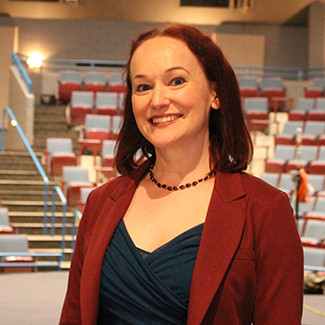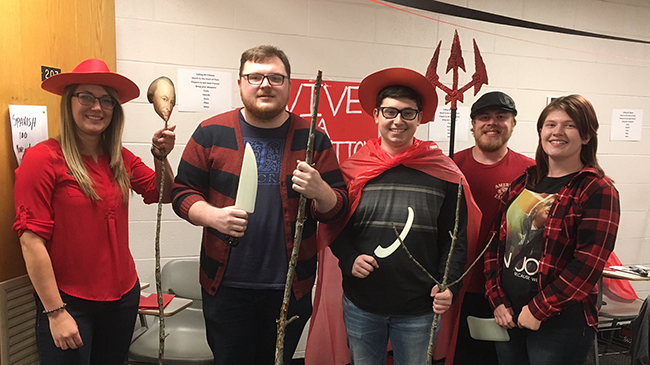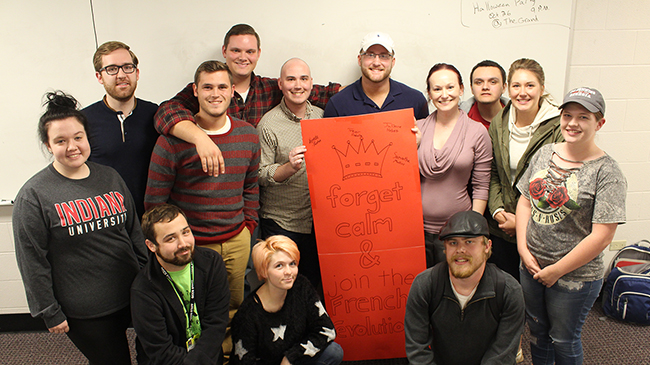 Margot Morgan
Margot Morgan
Assistant Professor of Political Science
School of Social Sciences
By Steven Krolak
(NEW ALBANY, Ind.)—Watershed. Turning point. Crucible. Point of no return.
Such are the confident clichés of historical interpretation that students are obliged to apply to moments in time.
But what would history be like if you didn’t know the outcome?
Probably a lot like your own life: a hodge-podge of speculations, calculated risks, successes, mistakes, gambles, hopes, hunches, perhaps some regrets.
For the students enrolled in POLS Y392: Problems of Contemporary Political Philosophy—Contemporary Political Ideologies, this semester, the past was present, and the question was not merely academic.
They were engaged in a role-play simulation of the French Revolution, portraying real life characters like Louis XVI, Maximillian Robespierre, Georges Danton and Jean-Paul Marat. Most of these students had no prior knowledge of these events, just a few notes about where their characters were coming from, and what they might have at stake. All of them wanted to win. But what does winning look like? And what would it cost?
“Since the French Revolution is the birthplace of political ideology, I used the game to help the students understand the origins of liberalism, socialism and conservatism,” said the instructor, Margot Morgan, assistant professor of political science. “The students get to experience, in a safe environment, the heated debates that come about when people are driven by ideological principles and the material interests that go with them.
Hindsight is 20:60, tops. This is better. This is alive.
All the world is a stage
Morgan’s tenure at IU Southeast began in 2013, after doctoral work at Rutgers University and research sojourns in Northern Ireland, Germany, Indonesia and elsewhere. In no time flat she had earned an IU Southeast Strategic Excellence grant and the Metroversity Outstanding Faculty of Adult Learners Award. Her energy and engagement, for the university and for students, are matched only by her flair for interdisciplinary approaches to her field, and her passion for classroom innovation.
At the heart of Morgan’s penchant for innovation is the connection between politics and theatre.
It’s a connection that Morgan traces to the very roots of each. In ancient Greece, politics and theatre were inseparable. Theatre functioned not only as a commentary on political life, but as a shaper of consensus and in some ways a conduit to the cosmos. A play was a political act for the community of citizens. Meanwhile, politics was and remains infused with theatrics, from oratory to staged events. This connection spans the gamut of political systems. While it is most crudely obvious in authoritarian dictatorships, with their constant need for regime-reinforcing pageantry, it is also at home in democracies, whose assembly halls owe their design and functions to the amphitheaters of the Hellenic world.
Morgan has been interested in politics and theater from childhood, when she would write plays and perform them for her parents in the living room.
“It was clear to me as a young person how much theater was involved in politics,” Morgan said. “It’s all a show, really.”
In college, she saw that theater could be something more—a tool against oppression. On a trip to Indonesia she learned that theatrical performers had been killed for opposing the brutal regime of General Hajji Suharto.
“The idea that a dictator would feel threatened enough by puppet masters to imprison, torture and kill them was crazy to me,” Morgan said.
The realization that theater could and did speak truth to power in places like Argentina, Brazil, Greece, Spain, Uganda and elsewhere inspired her first book, Politics and Theatre in Twentieth Century Europe: Imagination and Resistance. It also inspired her as a teacher.
The thought and work of the philosopher Hannah Arendt and the playwright Bertolt Brecht loom large in Morgan’s instructional playbook.
“I have an Arendtian conception of politics,” Morgan said. “Politics is about people coming together in good faith to create something new.”
That is also her definition of a successful classroom, an environment in which instructor and students collaborate to create new perspectives.
“What I want is civic education, to try to create good citizens,” Morgan said. “Civic education to me is about community, communication, cooperation, creativity and critical judgment.”
This vision is reflected in the work of the German playwright Bertolt Brecht (1898-1956), who pioneered a radically new style of community theater during the 1920s in Berlin.
In his workshop, Brecht wrote scripts that contained a moral dilemma, then invited participants to take turns playing all the roles, so that the individuals would come to see the value of each perspective.
Morgan has applied this method by teaching Brecht’s “The Measures Taken” in her Politics and Theatre class as a workshop.
“The play doesn’t intend to teach you anything specific, but to teach you how to think through a problem and come up with your own solutions, your own beliefs, your own decision,” Morgan said. “It requires imagination and innovation.”
Reacting to the past
Having integrated elements of theater into the learning environment, Morgan was primed to take note of an emerging movement in academia known as Reacting to The Past (RTTP).
Coalescing around practices initially pioneered by Mark C. Carnes, professor of history at Barnard College, RTTP has become, over the past 20 years, a full-fledged community of scholars at over 300 institutions worldwide committed to enlivening the teaching and learning of the past through semi-structured enactments of key turning points in history. RTTP was honored with the 2004 Theodore Hesburgh Award (TIAA-CREF) for outstanding innovation in higher education.
In the RTTP paradigm, students move from the audience to the stage, taking on roles of actual persons in history in simulations that they run themselves, guided by instructors and informed by selected primary sources.
RTTP curricula have been distributed since 2001, and new games are constantly being developed at workshops and conferences.
At an RTTP conference in Athens, Georgia, Morgan had an epiphany. She played the role of Lycon in a simulation of the trial of Socrates, and was stunned to find herself siding with the prosecution. She realized immediately that this was the sort of transformational tool she had been working towards on her own.
RTTP is not a history pageant. It’s a far more dynamic environment in which students receive a bit of background about their characters’ moral compass and motivations, along with a small amount of information about the context of the unfolding situation, before being launched into the flow of events.

Aux armes, citoyens! From left to right, Kenda Eley (Georges-Jacques Danton), Mikael Attebury (Maximillian Robespierre), Trace Myers (Jean-Paul Marat), Trevor Allen (Anne-Marguerite Andalle), and Samantha Mullins (Jean-Paul Hébert) are the revolutionary section leaders about to storm the National Assembly.
To Morgan, the advantages of this approach were immediately apparent. Instead of months of laying groundwork through traditional lecture that tends to render students shell-shocked, bored and apathetic, the game grabs them from the get-go and tosses them into the deep end.
The usual prerequisites to historical inquiry such as a foreign language or geography are tools to be acquired along the way as needed for characters to pursue their ends. In this way, the game rewards situational problem-solving, communication and political insight over the ability to go full-encyclopedic on any aspect of a topic.
Students experience the same events, but they don’t necessarily learn the same thing. And if the process by which things are revealed is different, so is the nature of those things themselves. There are answers, to be sure. But what constitutes an answer is different. In the tradition of Arendt and Brecht, the exercise builds not subject-matter experts, but independently-minded citizens.
Empowerment and empathy
By putting people into historical events, and giving them the opportunity to make decisions informed by their inner compass and not influenced by their pre-existing knowledge of the outcome, Morgan makes history incredibly personal.
On one level, the process is empowering.
“It expands students’ understanding of history to realize that if one little detail had changed the whole thing would have turned out differently,” Morgan said. “History is aa real, living thing.”
On another level, the role play—especially when a role is assumed that collides with a student’s own world-view—can provide insight into the mentality and motivations of others.
And that gets to the crux of why Morgan believes in this particular strategy, and also why she believes in the importance of history for political science.
For Morgan, making history personal means not only seeing oneself as a historical actor, but developing empathy through understanding the motivations of others.
“When you are acting, you are experiencing what your character experiences, you’re experiencing something different, you’re looking at something form a different point of view, and you become empathetic,” Morgan said. “Empathy is crucial for civic education, and for democracy.”
Winston Churchill’s dictum—that those who fail to learn from history are doomed to repeat it—doesn’t tell the half of it. People may very well repeat history, if they learn the wrong lessons, or if they think that by repeating it, the outcome may change to their advantage. Or they may not learn from it and end up not repeating it. It’s all about learning the right stuff, and for Morgan, that means grasping the human element and giving empathy a chance to inform decisions.
Inspiration from Java
It’s the last class meeting on the French Revolution—the debriefing.
Morgan distributes a hand-out with brief biographies of the historical persons that the students have played. The students read the subsequent fates of their alter egos aloud. Some who clung fiercely to the old ways were fed to the guillotine. Others, who led the fight for liberty, brotherhood and equality were also fed to the guillotine. And some weaseled through, changing allegiances when opportune, intent on little more than their own survival, and managed to die peacefully in their sleep 50 years later.
In the discussion, the students talk about the motivations behind their decisions, why they entered into strategic alliances with their enemies, the pressure of royal responsibility, the burdens of ideology and honor, how the Restoration reinstated so many aspects of the pre-Revolutionary social order.
The students refer to information that they have acquired by themselves along the way, information that helped them make principled decisions (also horse-trades, compromises, betrayals, bribes) they needed to make, to justify their positions, to build speeches in the National Assembly, to gain leverage, to outwit their foes, to publish and handbill, or simply to stay alive.
Morgan fields these observations and runs with them, facilitating the discussion with follow-up questions, speculations, contextual explanations and revelations about “the rest of the story.”
So much of the learning has already happened, almost without the students even being aware of it, but here, in the debriefing, there is a personal accounting, as the students reflect openly on what they have gained, where it has led them, how it has validated or changed their thinking, what it means.
At the front of the classroom, Morgan is animated, drawing energy from the exchange. This is as far from the traditional lecture as one can get without leaving desks behind altogether.
In her movement, her enthusiasm, and the flow of the discussion, another source of inspiration for Morgan’s teaching style becomes manifest: Sundanese dance.
It’s her own chosen metaphor for the role of the teacher, and one of the reasons why the RTTP role-play modality appeals to her.
While she was an undergraduate, Morgan was cast as a warrior in the Indonesian dance drama, “The Mahabharata.”
“It was the hardest thing I had ever done,” Morgan said. “It required me to forget everything I knew about how plays worked, in terms of the director, acting style, etc., as well as everything I knew about movement.”
Instead of a director commanding actors, Indonesian dance relies on the relationship between the drummer and the dancer to move the story forward.
“They adapt to one another as they go,” Morgan said. “They have to be in tune with one another.”
She found the same dynamic in Brecht, and when she began to design courses with theater and role-play elements, she adopted this structure.
“I set it up, I facilitate the structure of the exercise, I make sure it runs on time, and I pose questions, but don’t offer my own answers,” Morgan said. “The more you intervene, the more students look to you to intervene, but it’s up to them, to choose, to use their own judgment and see what comes of it.”

Margot Morgan with students from the French Revolution role-play.
The debrief morphs into a referendum on the game itself, as a learning tool. The students are unanimously supportive. For some, the demands of the role-play kept them engaged in a way that traditional lectures could not. For others, the positions of their characters required them to research more deeply than they would have otherwise, and made that work seem less like work. Several voice the view that the game allowed them to see the fruits of that additional research effort, and so helped with motivation. And all considered it a success in helping them to shed contemporary biases and engage with perspectives besides their own.
“I think there is something inherently emancipatory in performance art, especially when the artists involved in the process are working together as equals, rather than in a hierarchical structure,” Morgan said. “There is something immensely powerful and empowering in the ‘creation of the new,’ as Arendt would say, and the theatrical elements of my pedagogy aim to get at that.”


